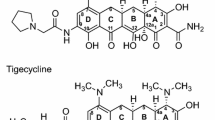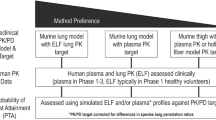Abstract
Neutrophils constitutively undergo apoptosis at sites of infection. The process of apoptosis controls inflammatory responses of neutrophils. However, little is known about the abilities of quinolones, which are often administered to patients showing infection disease, on constitutive apoptosis of neutrophils. The aim of this study is to evaluate abilities of quinolones on constitutive apoptosis of neutrophils. Tosufloxacin delayed neutrophil death and delayed neutrophil apoptosis. In contrast, ofloxacin, lomefloxacin, fleroxacin, sparfloxacin, and levofloxacin markedly promoted neutrophil death without affecting neutrophil apoptosis. Inhibitors of phosphoinositide 3-kinase (PI3K) and p38 mitogen-activated protein kinase (MAPK) attenuated the delay of neutrophil apoptosis by tosufloxacin, respectively. However, an inhibitor of extracellular-signal–related kinase did not alter the delay of neutrophil apoptosis by tosufloxacin. Moreover, tosufloxacin increases the expression of p85, p110β, and Akt protein in neutrophils. These results suggest that tosufloxacin may delay neutrophil apoptosis via activation of PI3K/Akt and/or p38 MAPK, and the other quinolones may promote neutrophil death without affecting their apoptosis.
Similar content being viewed by others
References
Romani, L., A. Menacci, E. Cenci, G. Del Sero, F. Bistoni, and P. Puccetti. 1997. An immunoregulatory role for neutrophils in CD4+ T helper subset selection in mice with candidiasis. J. Immunol. 158:2356–2362.
Kettritz, R., R. J. Falk, J. C. Jennette, and M. L. Gaido, 1997. Neutrophil superoxide release is required for spontaneous and FMLP-mediated but not for TNFβ-mediated apoptosis. J. Am. Soc. Nephrol. 8:1091–1100.
Cox, G. 1996. IL-10 enhances resolution of pulmonary inflammation in vivo by promoting apoptosis of neutrophils. Am. J. Physiol. 271:L566-L571.
Wei, S., J. H. Liu, P. K. Epling-Burnete, A. M. Gamero, D. Ussery, E. W. Pearson, M. E. Elkabani, J. I. Diaz, and J. Y. Djeu. 1996. Critical role of Lyn kinase in inhibition of neutrophil apoptosis by granulocyte–macrophage colony-stimulating factor. J. Immunol. 157:5155–5162.
Hebert, M. J., T. Takano, H. Holthofer, and H. R. Brady. 1996. Sequential morphologic events during apoptosis of human neutrophils: modulation by lipoxygenase-derived eicosanoids. J. Immunol. 157:3105–3115.
Kettritz, R., M. L. Gaido, H. Haller, F. C. Luft, C. J. Jennette, and R. J. Falk. 1998. Interleukin-8 delays spontaneous and tumor necrosis factor-α-mediated apoptosis of human neutrophils. Kidney Int. 53:84–91.
Lee, A., M. K. Whyte, and C. Haslett. 1993. Inhibition of apoptosis and prolongation of neutrophil functional longevity by inflammatory mediators. J. Leukoc. Biol. 54:283–288.
Colotta, F., F. Re, N. Palentarutti, S. Sozzani, and A. Mantovani. 1992. Modulation of granulocyte survival and programmed cell death by cytokines and bacterial products. Blood 80:2012–2020.
Azuma, Y., P. L. Wang, M. Shinohara, M. Okamura, Y. Inui, Y. Suese, and K. Ohura. 1999. Comparative studies of modulatory effect to the function of rat peritoneal neutrophils treated with new quinolones. Immunol. Lett. 69:321–327.
Azuma, Y., P. L. Wang, M. Shinohara, and K. Ohura. 2000. Immunomodulation of the neutrophil respiratory burst by endomorphins 1 and 2. Immunol. Lett. 75:55–59.
Azuma, Y., M. Shinohara, P. L. Wang, and K. Ohura. 2001. Differentiation by in vitro treatment of lidocaine-epinephrine and prilocaine-felypressine in neutrophils. Immunol. Lett. 77:151–158.
Azuma, Y., K. Ohura, P. L. Wang, and M. Shinohara. 2002. Endomorphins delay constitutive apoptosis and alter the innate host defense functions of neutrophils. Immunol. Lett. 81:31–40.
Klein, J. B., M. J. Rane, J. A. Scherzer, P. Y. Coxon, R. Kettritz, J. M. Mathiesen, A. Buridi, and K. R. McLeish. 2000. Granulocyte-macrophage colony-stimulating factor delays neutrophil constitutive apoptosis through phosphoinositide 3-kinase and extracellular signal-regulated kinase pathways. J. Immunol. 164:4286–4291.
Xia, Z., M. Dickens, J. Raingeaud, R. J. Davis, and M. E. Greenberg. 1995. Opposing effects of ERK and JUN-p38 MAP kinases on apoptosis. Science 270:1326–1331.
Widmann, C. 1998. Caspase-dependent cleavage of signaling proteins during apoptosis: A turn-off mechanism for antiapoptotic signals. J. Biol. Chem. 273:7141–7147.
Jarpe, M. B., C. Widmann, C. Knall, T. K. Schlesinger, S. Gibson, T. Yujiri, G. R. Fanger, E. W. Gelfand, and G. L. Johnson. 1998. Anti-apoptotic versus proapoptotic signal transduction: Checkpoints and stop signs along the road to death. Oncogene 17:1475–1482.
Wang, X., J. L. Martindale, Y. Liu, and N. J. Holbrook. 1998. The cellular response to oxidative stress; influence of mitogen-activated protein kinase signalling pathways on cell survival. Biochem. J. 333:291–300.
Frasch, S. C., J. A. Nick, V. A. Fadok, D. L. Bratton, G. S. Worthen, and P. M. Henson. 1998. p38 mitogen-activate protein kinase-dependent and–independent intracellular signal transduction pathways leading to apoptosis in human neutrophils. J. Biol. Chem. 273:8389–8397.
Aranha, O., D. P. Wood, Jr., and F. H. Sarkar. 2000. Ciprofloxacin mediated cell growth inhibition, S/G2-M cell cycle arrest, and apoptosis in a human transitional cell carcinoma of the bladder cell line. Clin. Cancer Res. 6:891–900.
Herold, C., M. Ocker, M. Ganslmayer, H. Gerauer, E. G. Hahn, and D. Schuppan. 2002. Ciprofloxacin induces apoptosis and inhibits proliferation of human colorectal carcinoma cells. Br. J. Cancer 86:443–448.
Miclau, T., M. L. Edin, G. E. Lester, R. W. Lindsey, and L. E. Dahners. 1998. Effect of ciprofloxacin on the proliferation of osteoblast-like MG-63 human osteosarcoma cells in vitro. J. Orthop. Res. 16:509–512.
Author information
Authors and Affiliations
Rights and permissions
About this article
Cite this article
Azuma, Y., Ohura, K. Alteration of Constitutive Apoptosis in Neutrophils by Quinolones. Inflammation 27, 115–122 (2003). https://doi.org/10.1023/A:1023804026871
Issue Date:
DOI: https://doi.org/10.1023/A:1023804026871




